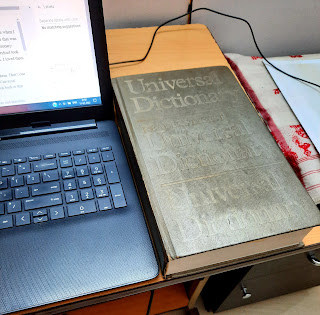The Story of a Dictionary
My first dictionary was a gift
from an uncle who was a teacher. He gave it to me when I passed the first Board
examination of my life at the age of 15 with a total score that was
comparatively good. Good in the family, that is. It was a Concise Oxford
Dictionary which served me well for many years. In due course of time, an Advanced Oxford took its place. I was in love with both these dictionaries, so
to say. I loved words. I loved them so much that I didn’t love anything else apparently.
Words are
drugs. You can get addicted to them. I was intoxicated by them. That’s one of
the reasons why I leaped at the opportunity when a Reader’s Digest Universal
Dictionary was offered to me at a discounted price in 1991. When I look back at
that opportunity, it appears more like fiction.
I was giving
a party after I passed the master’s in English language and literature while
working as a schoolteacher in Shillong. The party was arranged at a friend’s
house since my own rented house was a bachelor’s meagre accommodation. That
friend, let me call him Y, brought out the brand-new massive dictionary and asked
whether I wanted it for a price he quoted or he asked me to quote. I forget certain
details. I remember that we were all quite drunk. I remember that the deal was
struck rather instantaneously. I also remember what Y told me about how he had
got the dictionary. He had got it as a gift while subscribing to the Reader’s
Digest magazine. Later on I learnt that he had no habit of reading any
magazine, let alone subscribe to one. He was not a reader at all. How he came
by that dictionary remained a mystery to me for ever. Why he chose to give it
to me at a high discount was a bigger mystery. Why he forged a story about a
subscription was also a mystery.
I cannot ask
him. Y is no more. Even if I had asked, I would only have got a new story.
There was something miasmic about Y’s entire dealings with me, as I realised later.
But he was a good man, no doubt. All good people have a miasmic aura about
them. That’s something I came to notice many years after the Universal
Dictionary became my prized possession. People like me who were invariably
perceived and projected as bad had a deleterious transparency. Today I am far
less transparent than in those days and hence I am not perceived as bad by
people around me. I think so, at least.
The Universal
Dictionary has continued to occupy space on my bookshelf to this day though I
never use it. I depend on an app in my phone now when I need to check meanings.
Or there is the omniscient Google. Between the infinite omniscience of Google
and its noncorporeality rises the miasma of some memories that has the corpulence
of a massive dictionary.

Hari OM
ReplyDeleteHah! This triggered memories of a wee Collins sitting on my shelf that was gifted by an elder long back, who sought to encourage my writing. I love it for the object it is and also for the fond memory of an erudite gentleman - but treat it also as a treasure that needs preserving in case it falls apart. Thus, I too rely on the modern, touch of a key variety! YAM xx
Certain things are precious just because of memories.
DeleteOMG, I am sure I have my dictionary somewhere in the house. It was such an essential part of growing up.
ReplyDeleteToday's generation wonders what a dictionary is 😊
DeleteThis made me smile ��. especially when you said , Y would have told you another story! Friends are always like that. Sorry to know that he is know more. I love words too, but I realised it quite late. This brought back memories when I got my new Oxford Dictionary. It felt like a prize .
ReplyDeleteFriends are rather odd creatures, aren't they?
DeleteInteresting observations...
ReplyDelete🙏
DeleteDictionaries have their own stories behind. In many of our homes, they are like an asset that someone inherit from his parents or grand parents!
ReplyDelete//I cannot ask him. Y is no more. Even if I had asked, I would only have got a new story. There was something miasmic about Y’s entire dealings with me// You helped me to smile in this line, sir :-)
Yes, my father had quite a few dictionaries: English - Malayalam, Hindi-Malayalam, Malayalam - Malayalam, and so on. They are still there in the family collection, i think.
DeleteAlways good to read your life❣️
ReplyDelete🙏
DeleteThat's an interesting way to learn new words.
ReplyDeleteI am glad to have had teachers who strictly encouraged the use of dictionary in my junior grades, which helped me learn a variety of new words. But i've always loved the Thesaurus more. And, like you said, words are drugs, you can get addicted and intoxicated by them.
ReplyDeleteMan is a word-making animal, after all.
DeleteWords really are drugs, reminds me of something one of the three Musketeers said, "Only the wrong words are a complete waste of time, the right words, can make a lasting impression more than a thousand of one of those kisses."
ReplyDeleteAnd yes good people do smell different at times...xD
That's a lovely addition to the post from the musketeer.
Delete